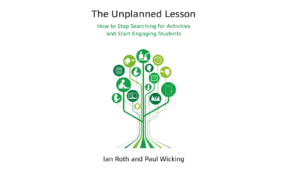Having been fortunate enough to attend a number of ELT conferences this year, I have decided to provide an overview of the last two, namely the IATEFL Hungary conference entitled Engaged – Spotlight on Learning, held in Budapest on 4-5th October 2019 and the 32nd IATEFL BESIG Annual Conference: Back to Basics held in Berlin on 11-13th October. I will be reflecting on the impressions, selections, and decisions these two events have created and which I plan to take action on.
Engaged – Spotlight on Learning
The key focus of the two days in Budapest was a question tickling the fancy of many ELTers, namely the way we do and should engage our learners. Coming at this from several perspectives, I can naturally reflect only on the talks I attended, so please allow me some subjectivity in my choice of attendance. We heard various approaches: the neuroscientific (André Hedlund), the psychological (Sarah Mercer, Kata Csizér, respectively), the data-oriented (Nóra Tartsay), the scientific research-based approach (Enikő Öveges and Brigitta Dóczi), learner autonomy-focused (Lawrie Moore-Walter), the reflective (Daniel Xerri), and the critical thinker (John Hughes) among others.
I genuinely believe these issues are all pointing in the direction of engagement as a process that works both ways, i.e., from learner to teacher and vice versa. If we, as practitioners, are doubtful and always struggling with our wellbeing and professional development (which paths to follow, which activities to use, how to evaluate, what tools support my reflection), it is also expected of language learners to have engagement issues. Can we be in alignment at all? How we tackle these is what this conference attempted to provide us insights with in the form of a wide range of thought-provoking plenaries and workshops, and dare I say conversations while queuing around the coffee machine – always the VAT of conferences (VAT = Value Added Time).
A few quotations to give you a feel of the event:
Working on relationships with learners is vital.
S. Mercer
If teachers ask on average, two questions a minute… teachers ask 2-4 million questions during a career. What type of questions?” (J. Hughes)
J. Hughes
Provide choice and let learners determine topics.
L. M. Walter
Beliefs we hold about our teaching, our learners, these biases, are understood through reflection, but it must not only be a reflection on the past. Reflection for action, looking towards the future to bring about change in our learning environment, is needed…. Reflection is a means of respecting ourselves.
D. Xerri
There are no magical solutions in neuroscience. It must be approached in education by applying research and results from pedagogy and psychology as well… Reward helps engagement – they question is, what kind of reward?
A. Hedlund
Back to Basics in Berlin
I am writing this as I am heading towards the event and am already in anticipation of that sense of arriving home from a professional point of view. So many like-minded professionals will be presenting to the best of their abilities with a focus on coming back to personal and professional roots … “to create a space and reflect on business English teaching… and our roles as business English teaching practitioners and our evolving relationships with our clients and learners.” (Conference program, p.3, Dana Poklepovic, and Evan Frendo, IATEFL Besig joint coordinators) This annual event is unique in that it is the only SIG /Business English Special Interest Group that organizes a yearly conference, the only international event of this size that serves the interests of BE teachers and trainers and coaches in Europe and is, quite amazingly, organized entirely by volunteers. So, three cheers here for all the work they put in!
By reflecting – after such an intense and stimulating event, we automatically reassess existing ideas we carry along with ourselves about our profession, thus perfecting our tools and methodologies, everyday teaching routines to garner that engagement for ourselves and our learners alike – but at a deeper level.
Our fascination with what is ground-breaking proof that the thinking and research in and around ELT are moving towards mapping the internal terrain of teacher-learner relationships and communication beyond deciphering methodologies and approaches employed.
To create an environment conducive to an optimal state of mind, body, and soul, all these need to be catered for, but without adding to the teacher workload, i.e., expecting extreme effort on the part of the teacher to achieve this. Always giving, supporting, guiding, leading, teaching leads to burnout, which is now a typical turn in social media, on TV, and surfaces in research also (cf. S. Mercer). Besides the obvious organizational, institutional, and state-level interventions, teachers themselves can do much to be more in alignment with what all educators set out to do: to make the world a better place.
My fascination with the internal landscape of learning has led me to attend the talks I will be writing about. From plenaries to interactive workshops and fishbowl discussions, there was a wide variety of opportunities available to attendees.
We are sailing amidst waves, not turbulent, but I do not see calm waters either. We are at the cusp of a surge of new energies and focuses mostly at the intersection of disciplines. Again, my personal preferences in professional themes guide me along.
The fundamental nature of business English language teaching, training, and coaching are evolving, moving in a direction that understands the need for learners, clients to step into the space opening up in the time spent with language professionals, each supporting this transition with their unique approaches.
Here again, I saw and heard the challenging questions beyond plain inquiry, restructuring existing concepts and constructs we have built to shelter like walls that keep us safe. What is outside these walls…? Well, not our comfort zone, for sure… Learners rejecting to use books, learners no longer motivated by traditional methods, AI moving in… So, no safe sailing, no walls to protect… Or restrict…
The question we may have in our heads at this point is, what lies beyond all this? What are we gravitating towards? Do we need to redefine our roles and those of our learners?
Keep these questions in mind as I write about what I experienced in Berlin in some detail:
The first plenary was Anna Kankaanranta discussing BELF (business English as a lingua franca) issues, and the key, piercing thought I left with was: for learners in a corporate setting, is everyday MNC (multinational company) usage of English, is just part of employees’ work? Looking behind this question, the answer is no, with so many aspects to this, one being that English language usage in a business environment may be multi-level: everyday interactional BELF level, and official level, acting like a tool. Learning, most often takes place on the job, as language usage is much rather interaction-based, and language as a tool to communicate something from management down cannot be fully perceived as an end in itself. English can be seen as being co-created as a multi-lingual Franca – a new perspective for MNCs in their language and general communication management.
How to live the life you want – does this sound like an advert? Helen Strong – nomen est omen – showed us how following gut instincts, being courageous and resilient, will get you to where you truly belong – personally and professionally. Being boxed in and conforming may be fitting for some time, but the time comes to move on. The question you need to ask yourself continually is: Are you running away from something right now or towards something bigger and better? Be strong – you might end up coaching online from a small island on the Outer Hebrides as Helen has…
David Guerrero managed to stir up whatever idle thoughts we may have possessed about language coaching, by introducing us to a LC program in a Japan-based engineering/tech company, Mercari. Countering low motivation for participants of language programs was the key to creating a unique coaching program for the company in a country where 72% of people say they cannot speak English. The goal was to overcome the “English allergy” employees have. With serious research presented, we moved from participant portfolios to data-driven methodology descriptions and checklists of action plans in the space of a 45-minute workshop.
Louise Goodman has a sure hand at panning out ideas that stick. Are we teachers, trainers… coaches? We are TTCs: an emerging group of language professionals: TTC stands for teachers, trainers & coaches. What should this group maintain, alter, and change in their professions was the key idea attendees made discoveries about. Maintaining certifications, experience, providing feedback, working with needs analyses, and assessments, using books to a smaller/larger extent, creating clear learning objectives. Adding soft skills, coaching, mindfulness, mindset issues, ethical and sustainability aspect to our professional statements, and changing soft to core skills in our communication with MNCs, increasing learner accountability (a buzzword at this conference), providing a framework for learners to self-assess and measure their progress.
She used all the classic tricks of the trade: from an engaging theme on best practices in business English to handing out chocolate to attendees… Well worth participating. On a more serious note, we, as language professionals, must get accustomed to the idea of a bit of elasticity in terms of our roles and tasks, simply because the expectations, needs, and goals of our clients are also evolving. Imagine a chocolate confectionery selling only one type of chocolate – without diversification or brand-stretching, their sales would not increase over time. Just the same with our knowledge and incomes, which would dwindle if new add-ons, niches were not pulling us towards greener fields… Lots of food for thought here.
In fishbowl format, there were three separate conversations, of which I attended one, in which a variety of themes came into the space between us. We looked at ways to justify course books vs. digital materials resulting in an understanding and acceptance of an offline alongside online approach. It is important to have alternatives and make decisions based on learner – teacher goals and expectations and the context the learning takes place in. Another theme creating a somewhat emotionally charged debate was the transition from teacher to coach, which we all agreed needed clarification regarding these roles and where overlaps exist. This led to a discussion of the whole “business English” thing and exploring how comfortable we are with the idea of training and coaching. We could be labeling ourselves “facilitators of communication,” a recurring thought in various forms throughout the conference. Our questions and comments then turned towards bettering and adding to future IATEFL conferences.
Kirsten Waechter explored the similarities and differences in which we teach or train in a culture other than our own. She explained that the two key issues to be addressed in preparation for teaching in this sort of context are the teaching style/classroom management and time management. In light of her experiences with a variety of groups of different cultural backgrounds, reflections made her rethink underlying schemas, a teacher/trainer with a certain cultural background has. Assumptions need to be handled with much agility and willingness to rethink, readjust, and adapt to new cultural contexts, fabrics. “Unthink teaching styles” may come into play as assumptions about seating, timeframes, instructions we use as language professionals are not necessarily in alignment with the cultural background of learners and backfire in areas such as loyalty, trust, values, and respect among learners and between learners and teacher/trainer.
Dale Coulter, from York Associates, proved to be an impeccable presenter and led us along an intricate line of thought regarding the values we are providing our clients, our learners. He proposed that we should be communicating with clients about how we support their performance. We need to reunderstand basic notions instead of over-emphasizing learning jargon – this will realign us, language professionals, with the thinking of HR, hardcore ROI, and KPIs. In this new communication space, we could focus on filling that skills gap which business analyses describe.
If we change the language we use to describe our skillsets and actions, the what and how of our delivery, it will impact on our way of thinking about these, and it will also move us away from what we can teach and train towards what clients can reach and gain. You do notice the intentional rhyming I added there… The message is to adjust our mindsets to accommodate for a shift towards the development of performance at the workplace instead of learning outcomes. Instead of the dominance of language competences, communication skills might be moving more into the limelight. Time to fix the language mismatches, corporate decision-makers are finding less and less amusing.
Naturally, there were so many more genuinely inspiring talks and corridor conversations in these three days that I could go on and on – all the more reason for you to join locally or at annual IATEFL conferences.
My favorite quotes from Berlin:
We admit (as language practitioners), that we can’t teach these students everything – it’s about learning on the job.
Anna Kankaanranta
No gap – no coaching” (no goal – nothing to reach), defining language coaches as “helping learners to want to learn.
David Guerrero
What do we want to do? Or rather: what do we want to be?” Fishbowl panel discussion
Final reflections
Both conferences, on the whole, got us to consider our roles and the learning environment with our critical hats on. Our engagement focus went beyond what we can do as conference speakers at both locations provided fresh takes on questions – let’s admit it – we have been asking ourselves, perhaps not voiced… but the thoughts have crossed out minds. To unearth the specific questions each of us need to answer initially means finding ideas to follow. Attending the conferences and writing this article has benefitted me personally, each step creating a point in time for actions and reactions. After all is said and done, how we handle our own reflections decides what direction we take to move forward.




